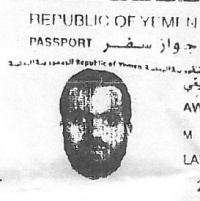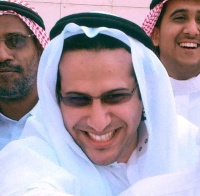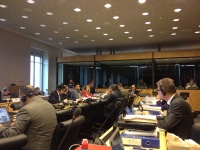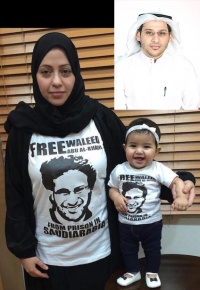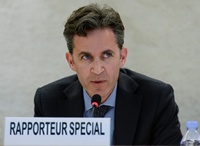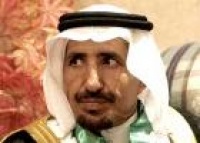Saudi Arabia: Alkarama presents alarming situation of torture to UN Committee members
 CAT members are holding a session
As a party to the Convention against Torture and Other Cruel, Inhuman or Degrading Treatment or Punishment (UNCAT), Saudi Arabia is reviewed by the United Nations Committee against Torture (CAT), which assesses the country's compliance with its obligations under the UNCAT. In view of Saudi Arabia’s second review on 22 and 25 April 2016, Alkarama provided the Committee members with an extensive report on the systematic practice of torture in the country and will personally brief the CAT members on its key concerns during the Committee’s 57th session in Geneva (Switzerland). After analysing the information sent by NGOs and the State in its report, the CAT will engage in a constructive dialogue with the State aiming to improve the situation of torture.
CAT members are holding a session
As a party to the Convention against Torture and Other Cruel, Inhuman or Degrading Treatment or Punishment (UNCAT), Saudi Arabia is reviewed by the United Nations Committee against Torture (CAT), which assesses the country's compliance with its obligations under the UNCAT. In view of Saudi Arabia’s second review on 22 and 25 April 2016, Alkarama provided the Committee members with an extensive report on the systematic practice of torture in the country and will personally brief the CAT members on its key concerns during the Committee’s 57th session in Geneva (Switzerland). After analysing the information sent by NGOs and the State in its report, the CAT will engage in a constructive dialogue with the State aiming to improve the situation of torture.
Saudi Arabia: report submitted to the Committee against Torture in the context of the second periodic review
Saudi Arabia: Sudanese national released after 8 months of arbitrary detention
 Alkarama welcomes the recent release of Waleed Al Dod Al Mekki Al Hussain, a Sudanese national who was arrested by the Saudi General Intelligence forces on 23 July 2015. According to Al Hussain’s family, his activities as founder and editor of Sudanese government critical online news site Al Rakoba were the cause for his arrest. Before his release, Al Hussain, who has been living in Saudi Arabia for 15 years, was told by the prison authorities that he would be deported to Sudan. But he feared to be subjected to further persecution, torture and execution, as he has received numerous threats from the Sudanese National Intelligence and Security Services (NISS) since the foundation of Al Rakoba.
Alkarama welcomes the recent release of Waleed Al Dod Al Mekki Al Hussain, a Sudanese national who was arrested by the Saudi General Intelligence forces on 23 July 2015. According to Al Hussain’s family, his activities as founder and editor of Sudanese government critical online news site Al Rakoba were the cause for his arrest. Before his release, Al Hussain, who has been living in Saudi Arabia for 15 years, was told by the prison authorities that he would be deported to Sudan. But he feared to be subjected to further persecution, torture and execution, as he has received numerous threats from the Sudanese National Intelligence and Security Services (NISS) since the foundation of Al Rakoba.
Saudi Arabia: after three years detained without charges and an unfair trial, Badr Halal Jasem Al Taleb may face death penalty
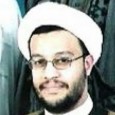 On 17 March 2013, 38-year-old sheikh Badr Halal Jasem Al Taleb was arrested at his house without a warrant by members of the police and the General Investigation Directorate (or "Mabahith") forces under the control of the Ministry of Interior responsible for investigating security related crimes, and taken to Riyadh Hair Prison.
On 17 March 2013, 38-year-old sheikh Badr Halal Jasem Al Taleb was arrested at his house without a warrant by members of the police and the General Investigation Directorate (or "Mabahith") forces under the control of the Ministry of Interior responsible for investigating security related crimes, and taken to Riyadh Hair Prison.
Saudi Arabia: Yemeni National Released After Over 5 Years of Arbitrary Detention
Alkarama welcomes the release, on 9 February 2016, of Yemeni national Awad Al Hayki, who had been arbitrarily detained in Saudi Arabia for over five years. Extradited to Saudi Arabia from Qatar on 18 October 2010, Al Hayki was severely tortured in the Al Qasim Prison, where he was detained for almost a year in solitary confinement without being able to communicate with his family. Held for over two years without charges, Al Hayki was first presented to court in 2013, after Alkarama sent his case to the United Nations Special Rapporteur on Torture and other cruel, inhuman or degrading treatment or punishment (SRT) on 13 March 2013. In 2014, after two hearings, the judges decided not to charge him; nevertheless, he remained in prison until February 2016.
Saudi Arabia: UN Experts Request Immediate Release of 9 Human Rights Defenders Arbitrarily Detained
On 4 September 2015, the United Nations Working Group on Arbitrary Detention (WGAD) adopted Opinion 38/2015 calling upon the Saudi authorities to immediately release nine prominent human rights defenders, including head of Monitor for Human Rights in Saudi Arabia (MHRSA) Waleed Abu Al Khair, members of the Saudi Civil and Political Rights Association (ACPRA) Abdul Karim Al-Khodr, Mohammad Al Qahtani and Abdullah Al Hamid, blogger Raif Badawi and human rights defender Fadhel Al Manasif, whose case Alkarama raised with the United Nations Secretary General in view of its report on reprisals of 2011. According to the UN experts, all nine men were imprisoned solely for exercising their legitimate right to freedom of expression and peaceful assembly.
Saudi Arabia: UN Experts Express Concern Over Torture Situation in the Country
On 9 December 2015, the United Nations Committee against Torture (CAT) – a body of 10 independent experts that monitors the implementation of the Convention against Torture (UNCAT) by its State parties – expressed its concern over the situation of torture in Saudi Arabia by publishing a List of Issues that should be addressed by the Saudi authorities during the country's second review at the CAT's 57th session on 22 and 25 April 2016. The experts were particularly concerned over the lack of definition of torture in Saudi legislation, the use of corporal punishments, the restriction of fundamental rights introduced by the anti-terrorism law of 2014, the repression of civil society and statements made under torture. All these issues were raised by Alkarama, the only organisation which collaborated with the CAT in this phase of the State review, in its submission sent to the UN experts on 27 July 2015.
Saudi Arabia: Arbitrary Arrest of Samar Badawi, Human Rights Activist and Sister to Raif Badawi
On 12 January 2016, human rights defender Samar Badawi was arrested by members of the Jeddah Bureau of Investigation and Prosecution, which had summoned her a few days before to appear for questioning. Detained with her baby daughter at the Alsalamah Police Station, she was interrogated for long hours about some tweets she posted from her Twitter account − such as congratulating human rights defender Mohamd Al Bajadi on his release in January 2015 − as well as other tweets she posted from her husband Waleed Abu Alkhair's Twitter account. Although Samar was released on 13 January, criminal proceedings against her may still be ongoing.
Saudi Arabia: UN Experts Alarmed Over Crackdown on Freedom of Expression
On 16 December 2015, the United Nations Special Rapporteur on the promotion and protection of the right to freedom of opinion and expression (SR FRDX) David Kaye, supported by other UN experts, published a press release expressing his deep concern over the growing repression of freedom of expression in Saudi Arabia, mentioning the cases of blogger Raif Badawi and human rights defender Mikhlif Al Shammari, brought to the attention of the UN by Alkarama, as well as that of Saudi-born Palestinian poet Ashraf Fayadh.
Saudi Arabia: Court of Appeal Upholds Sentence of 2 Years Imprisonment and 200 Lashes against Activist for Tweet Advocating for Peace and Tolerance between Shia/Sunni Communities
On 6 November 2014, human rights defender and writer Mikhlif Al Shammari was sentenced to two years imprisonment and 200 lashes after a single hearing for a tweet stating that he had faith in tolerance between Sunni and Shia and announcing that he will pray for that in a Shia mosque as a sign of solidarity, being himself Sunni. Accused of "stirring up public opinion," Al Shammari's sentence was upheld by the Al Dammam Court of Appeal on 2 November 2015 and his sentence is now enforceable at any time, meaning that the human rights advocate is at risk of arbitrary detention and lashes at any time. In view of the facts and of Al Shammari's impossibility to obtain a fair hearing in his country, Alkarama sent an urgent appeal to the United Nations Special Rapporteur on the promotion and protection of the right to Freedom of Opinion and Expression (SR Freedex) requesting him to urge the Saudi authorities to repeal the sentence and abandon all charges against Al Shammari.
 Algeria
Algeria Bahrain
Bahrain Djibouti
Djibouti Egypt
Egypt Iraq
Iraq Palestine/Israel
Palestine/Israel Jordan
Jordan Kuwait
Kuwait Lebanon
Lebanon Libya
Libya Mauritania
Mauritania Morocco
Morocco Oman
Oman Qatar
Qatar Saudi Arabia
Saudi Arabia Sudan
Sudan Syria
Syria Tunisia
Tunisia United Arab Emirates
United Arab Emirates Yemen
Yemen Other Countries
Other Countries

